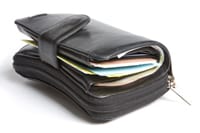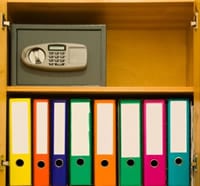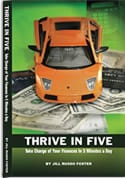 Are you prepared to handle anything life throws at you? This can include anything from an immediate crisis to a major life hurdle. Take a good look at your life and think about some of the situations I am talking about, and think about what you would need to do in your life to be prepared.
Are you prepared to handle anything life throws at you? This can include anything from an immediate crisis to a major life hurdle. Take a good look at your life and think about some of the situations I am talking about, and think about what you would need to do in your life to be prepared.
If we have to evacuate or run for cover, take this folder…
If you had to leave your home within a short amount of time (storm approaching, fire, flooding etc.) would you know what important papers to take with you? Could you gather all of them in 30 minutes or less? This should be a goal of yours, to have your papers organized and ready so you only have to grab one container (a hard drive, a file box, or a folder) – and go. In addition, what about those personal items that are irreplaceable? Could you grab those, too?
If something happens to me, you know what to do…
What if the person who handles the finances passes away? Would anyone else know where all the financial records are? Do you know where all your assets are? Do you know what liabilities you are responsible for? In many families, one person handles everything. Both people should know what is going on – just in case. That’s especially true for the paperless households who do everything online. More than one person must be able to access all of the accounts because there won’t be a file cabinet to sort through.
If you are prepared and organized ahead of time, it will make life much easier for you. Start to think about this today and make a plan that works for your situation. Being ready and knowing what you should do will save you so much time and effort if you find yourself in a bad situation.
 Does the high price of gas have you thinking about whether or not to take your summer vacation this year? This doesn’t have to be the year of the staycation if you don’t want it to be. Here are some tips for taking your vacation and saving money too:
Does the high price of gas have you thinking about whether or not to take your summer vacation this year? This doesn’t have to be the year of the staycation if you don’t want it to be. Here are some tips for taking your vacation and saving money too:
 On Tuesday, May 17, let’s celebrate all those people who have stacks and piles of stuff!
On Tuesday, May 17, let’s celebrate all those people who have stacks and piles of stuff!  Question: Which financial institution created a credit card based on an urban legend?
Question: Which financial institution created a credit card based on an urban legend?
 You come home from a long day and your purse or wallet is stuffed with little receipts. They are from the bank, the store, and the dry cleaners. You probably even have your paystub stuffed in there. Do you have a system for dealing with all these little pieces of paper? If not, now is the time to start.
You come home from a long day and your purse or wallet is stuffed with little receipts. They are from the bank, the store, and the dry cleaners. You probably even have your paystub stuffed in there. Do you have a system for dealing with all these little pieces of paper? If not, now is the time to start. Hurray! Tax season is over (unless you filed an extension).
Hurray! Tax season is over (unless you filed an extension).

